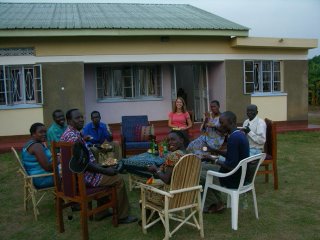 by Holly
by HollyLast night I had a conversation with someone at a goodbye party for yet another transient ex-pat friend (we’ve been here 14 months, and that’s longer than most people stay so we’ve had several waives of goodbyes already). We passed the small talk about our holidays and then she asked if it was hard to come back to Lira. I had a warm sense of joy because the answer is decidedly no. We spent two weeks in the UK at my parents place together with Travis and Tina and I needed it. Maybe “need” is too strong, but I found deep comfort from much that has disturbed my body soul and mind in the soft couches of my parents cozy living room, the food, the walks through the woods, conversations and prayer with wise parents and caring siblings in front of warm fires and in pubs, baking 6 kinds of Christmas cookies in a beautiful kitchen, going to bed without wrestling a mosquito net, feeling cold for the first time in over a year, even shopping was strangely comforting.
 I liked looking at all the beautiful stuff I can live without. I appreciated all the material comforts of “home” and was happy to discover that I don’t need them but they’re there whenever I want to enjoy them. One morning I was drinking some thick Italian espresso out of adorable cups the appropriate size. My own set of equally adorable espresso cups are in a box somewhere in Ben’s parents basement and who knows when I’ll use them again. I thought of my cups and was about to tell my mom that I missed them when I realized that I didn’t--this was in fact the first time that I’d even thought of them since they were packed away. I am grateful for many things when they’re there to enjoy but I’m okay without them. That knowledge is freeing.
I liked looking at all the beautiful stuff I can live without. I appreciated all the material comforts of “home” and was happy to discover that I don’t need them but they’re there whenever I want to enjoy them. One morning I was drinking some thick Italian espresso out of adorable cups the appropriate size. My own set of equally adorable espresso cups are in a box somewhere in Ben’s parents basement and who knows when I’ll use them again. I thought of my cups and was about to tell my mom that I missed them when I realized that I didn’t--this was in fact the first time that I’d even thought of them since they were packed away. I am grateful for many things when they’re there to enjoy but I’m okay without them. That knowledge is freeing.
It’s good to be back. We were surprised by how easy it felt and how nice it was to come back to our house. It is good to see friends and colleagues again. While we were gone one died and one had a child. It is good to get back to work, to get started on new reconciliation opportunities I’ve been looking forward to. It was good to hang the wind chimes I bought in the UK on my porch, to sit in my living room and listen to them. It sounds like home.
 by Holly
by Holly Of course Philip came so late that he missed the meal but no one minded or apologized. When we told him to come for dinner he said, “Oh, I’ve learned that when you come to dinner here you’re supposed to bring your own drinks like a bottle of wine.” He told us this as if we would think that it was as socially bizarre as he did. I remember when we first got here and were surprised that no guest ever brought anything to share.
Of course Philip came so late that he missed the meal but no one minded or apologized. When we told him to come for dinner he said, “Oh, I’ve learned that when you come to dinner here you’re supposed to bring your own drinks like a bottle of wine.” He told us this as if we would think that it was as socially bizarre as he did. I remember when we first got here and were surprised that no guest ever brought anything to share. Re-entering the western world I was surprised by obvious things. First, there are a whole lot of white people. I haven’t seen so many in one place for a long time. I’ve kind of gotten used to being a minority. In England my skin didn’t feel so novel. On New Year’s Eve for a few minutes with Philip and company I was once again the token white.
Re-entering the western world I was surprised by obvious things. First, there are a whole lot of white people. I haven’t seen so many in one place for a long time. I’ve kind of gotten used to being a minority. In England my skin didn’t feel so novel. On New Year’s Eve for a few minutes with Philip and company I was once again the token white.